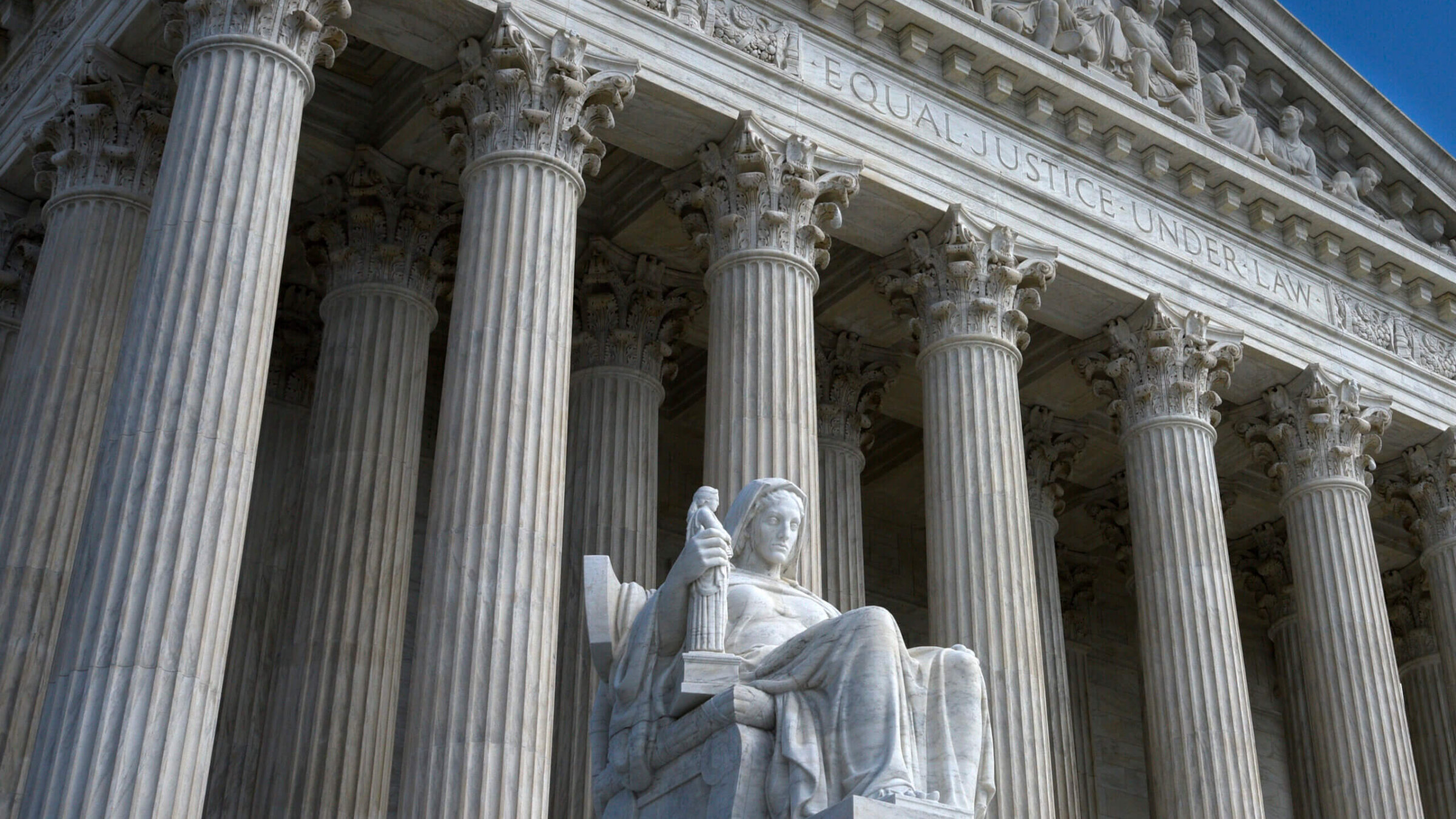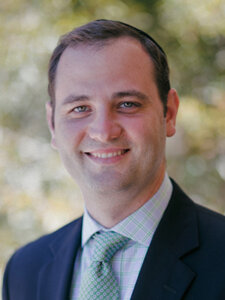A new case before the Supreme Court could make Shabbat observance easier
Groff v. DeJoy is looking to expand the religious accommodations employers must provide

The U.S. Supreme Court Building in Washington, D.C. Photo by Robert Alexander/Getty Images
The Supreme Court announced earlier this month that it will hear yet another blockbuster church-state case, Groff v. DeJoy. At the core of the case lies a conundrum that has plagued federal law for nearly half a century: How far must employers go when providing religious accommodations?
Until now, the court’s interpretation has required little of employers. Unsurprisingly, this position has long roiled, among other religious minorities, American Jews, who often find themselves seeking accommodation in the workplace for religious practices such as observance of Shabbat. In taking the case, the Supreme Court has signaled its willingness to revisit its widely-criticized interpretation of existing protections, providing optimism to religious employees hoping to navigate the competing demands of faith and work.
Groff v. DeJoy is the latest case seeking to have the court expand the protections afforded religious employees in the workplace. It involves a U.S. Postal Service employee, Gerald Groff, who sought to have his Sunday observance of the Sabbath accommodated. The Postal Service ultimately refused to do so, arguing that doing so would have had a significant impact on its operations. A federal court of appeals found in favor of the Postal Service and the employee appealed to the Supreme Court.
So, under what circumstances should the Postal Service have to accommodate the Sabbath observances of its employee? Employers’ obligation to accommodate employees’ religious practice derives from Title VII of the 1964 Civil Rights Act. Because the original text of Title VII provided limited guidance in terms of what kind of protections it afforded employees from religious discrimination, Congress subsequently amended Title VII in order to make clear that employers were required to “reasonably accommodate” an employee’s “religious observance or practice” unless, and here is the kicker, providing an accommodation would present an “undue hardship.”
Like so many legal standards, “undue hardship” obscured more than illuminated. At what point can an employer claim that the hardship caused by a requested accommodation is “undue”? In a landmark 1977 case, TWA v. Hardison, the Supreme Court provided a surprising — and dubious — answer to the question. Like in Groff, Larry Hardison, the plaintiff and a member of the Worldwide Church of God, had requested to avoid work on his Sabbath — for him, on Saturday — in keeping with his religious commitments. But his employer claimed that they were unable to accommodate the request because doing so would have violated the seniority system that the company had negotiated with the representative union. The plaintiff, as a result, lost his job, and he sued TWA for failing to accommodate his religious practice.
The Court found in favor of TWA. In so doing, it famously provided the following gloss on how far employers were required to extend themselves when it came to religious accommodations: “To require TWA to bear more than a de minimis cost” — that is, a trivial or minor cost — “in order to give Hardison Saturdays off is an undue hardship.” Thus, even if TWA could have accommodated Hardison by, for example, paying overtime wages to another employee to cover the Saturday shifts, it was not required to do so. Such “additional costs” would constitute more than the “de minimis” investment required by Title VII.
But a straightforward reading of “undue hardship” certainly seems to require that employers exert more than the barest minimum effort, leading any number of critics to attack the court’s analysis in Hardison. In requiring so little of employers, detractors argue, it has left employees seeking religious accommodations from federal law with limited legal protections. For example, in rejecting Groff’s claims for religious accommodation, the federal court of appeals noted that everything from “negative impacts on the employer’s operations” to even “reduced employee morale” have served as sufficient justification for not providing a religious accommodation.
Among the problems with this prevailing standard is that those left most exposed by the court’s stingy interpretation of Title VII have been religious minorities, whose practices often don’t track the prevailing rhythms of the workplace. According to one brief filed before the Supreme Court in 2020, nearly half of Title VII accommodation appeals are filed by religious minorities, even though those minorities only account for 15% of the population.
Unsurprisingly, American Jews have been at the forefront of attempts to enhance the protections afforded religious employees in the workplace, as diluting employers’ obligation to accommodate religious practices in the workplace continues to present a significant obstacle to Shabbat observance. Already back in 1977, a broad coalition of Jewish organizations filed amicus briefs before the Supreme Court supporting the plaintiff in Hardison, including the National Jewish Commission on Law and Public Affairs, the Central Conference of American Rabbis, the American Jewish Committee and the Anti-Defamation League, among many others. In subsequent decades, a diverse range of Jewish organizations have supported the Workplace Religious Freedom Act, an ultimately unsuccessful attempt since 1999 to expand the religious accommodation protections afforded employees in the workplace.
Even today, the idea that employers need not expend more than de minimis resources and efforts to accommodate religious employees has generated criticism from across the political spectrum. It is one of the rare church-state issues where one can find at least some modicum of agreement in the pages of Fox News and Slate. It does, therefore, make one wonder why the court originally chose this interpretive route back in 1977.
Maybe the strongest explanation for the court’s decision comes from Justice Thurgood Marshall’s dissenting opinion in TWA v. Hardison. The lurking concern (one that Marshall emphatically rejected) was that recognizing a right in Title VII to religious accommodation granted too much protection, and too much power, to religious employees. That sort of power granted to religious employees to make demands on their employers might have consequences for other employees and therefore might trigger First Amendment concerns over establishing religion.
But as Marshall noted at the time, these concerns seem wildly exaggerated. The Supreme Court, on any number of occasions, has upheld laws accommodating religion so long as they don’t privilege those accommodations unequivocally and unyieldingly over all other interest. By contrast, the court has been clear for some time that “appropriately balanced” accommodations don’t trigger First Amendment concerns — a conclusion that has been further bolstered by more recent decisions that have further minimized the demands of separation of church and state.
Critics more recently have wondered what standard should replace the existing standard. Sure, we should require more of employers, but how much more? Some have worried that a standard that grants employees an unfettered right to religious accommodations would generate its own parade of horribles, such as a police officer’s refusal to protect an abortion clinic or a social worker’s demand to use Bible readings, as opposed to mental health counseling, to heal prison inmates.
But, in other contexts, the law has already found a pretty successful middle ground. When it comes to the accommodations required pursuant to the Americans with Disabilities Act, for example, undue hardship is interpreted to mean “significant difficulty or expense.” As a result, employers cannot satisfy their obligation by merely asserting that a requested accommodation imposes a “de minimis” burden; instead, they must extend themselves further in seeking to find an accommodation for those with disabilities, unless doing so will actually generate costs or difficulties that are significant. This standard has proven workable when it comes to accommodations under the ADA, providing good reason to think it could work as well in the context of religious accommodations in the workplace.
Time will tell as to which path the court ultimately chooses. For now, the court’s decision to hear Groff v. DeJoy holds out the hope of remedying a longstanding wrong and providing people of faith in the workplace with more expanded protections. Properly balanced, these sorts of accommodations will hopefully provide a middle ground, ensuring that the cost of entering the workforce need not be the discarding of one’s faith commitments.
To contact the author, email [email protected]
















